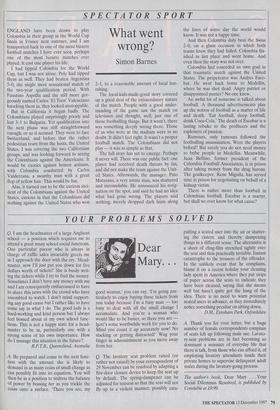SPECTATOR SPORT
What went wrong?
Simon Barnes
ENGLAND have been drawn to play Colombia in their group in the World Cup finals in France next summer, and I am transported back to one of the most bizarre football matches I have ever seen, perhaps one of the most bizarre matches ever played. It cost one player his life.
I had tipped Colombia for the World Cup, but I was not alone. Pete had tipped them as well. They had beaten Argentina 5-0, the single most sensational match of the two-year qualification period. With Faustino Asprilla and the still more gor- geously named Carlos 'El Tren' Valenciano knocking them in, they looked unstoppable.
But in California it began badly. The Colombians played surprisingly poorly and lost 3-1 to Bulgaria. Yet qualification into the next phase was still straightforward enough, or so it seemed. They were to face Switzerland, and before that the rather pedestrian team from the hosts, the United States. I was covering the two Californian groups, and was looking forward to seeing the Colombians against the Americans. It would be exotics against honest artisans, with Colombia conducted by Carlos Valderrana, a swarthy man with a great flop of yellow hair. This would be fun.
Alas, it turned out to be the curious inci- dent of the Colombians against the United States, curious in that the Colombians did nothing against the United States who won 2-1, to a reasonable amount of local hur- rahing.
The local-kids-made-good story covered up a good deal of the extraordinary nature of the match. People with a good under- standing of the game saw the match on television and thought, well, just one of those footballing things. But it wasn't, there was something deeply wrong there. Those of us who were at the stadium were in no doubt. It didn't feel right. It wasn't a proper football match. The Colombians did not play — it was as simple as that.
The full story has yet to emerge. Perhaps it never will. There was one public fact: one player had received death threats by fax, and did not make the team against the Unit- ed States. Afterwards, the manager, Pato Maturana, a very astute man, was shattered and inconsolable. He announced his resig- nation on the spot, and said he had no idea what had gone wrong. The players said nothing, merely dropped dark hints along the lines of some day the world would know. It was not a happy time.
And then Colombia duly beat the Swiss 2-0, on a glum occasion in which both teams knew they had failed. Colombia fin- ished in last place and went home. And even then the story was not over.
Colombia had conceded an own goal in that traumatic match against the United States. The perpetrator was Andres Esco- bar. He went back home to Medellin, where he was shot dead. Angry patriot or disappointed punter? No one knew.
An awful lot of nonsense is talked about football. A thousand advertisements play up the notion of football as a matter of life and death. 'Eat football, sleep football, drink Coca-Cola.' The death of Escobar is a lasting rebuke to the profiteers and the exploiters of passion.
Rumours, only rumours followed the footballing assassination. Were the players bribed? But surely you do not need money to bribe people in Medellin. Meanwhile, Juan Bellino, former president of the Colombia Football Association, is in prison after taking money from the drug barons. The goalkeeper, Rene Miguila, has served time in prison for negotiating on behalf of a kidnap victim.
There is rather more than football in Colombian football. Escobar is a martyr, but shall we ever know for what cause?


















































































 Previous page
Previous page